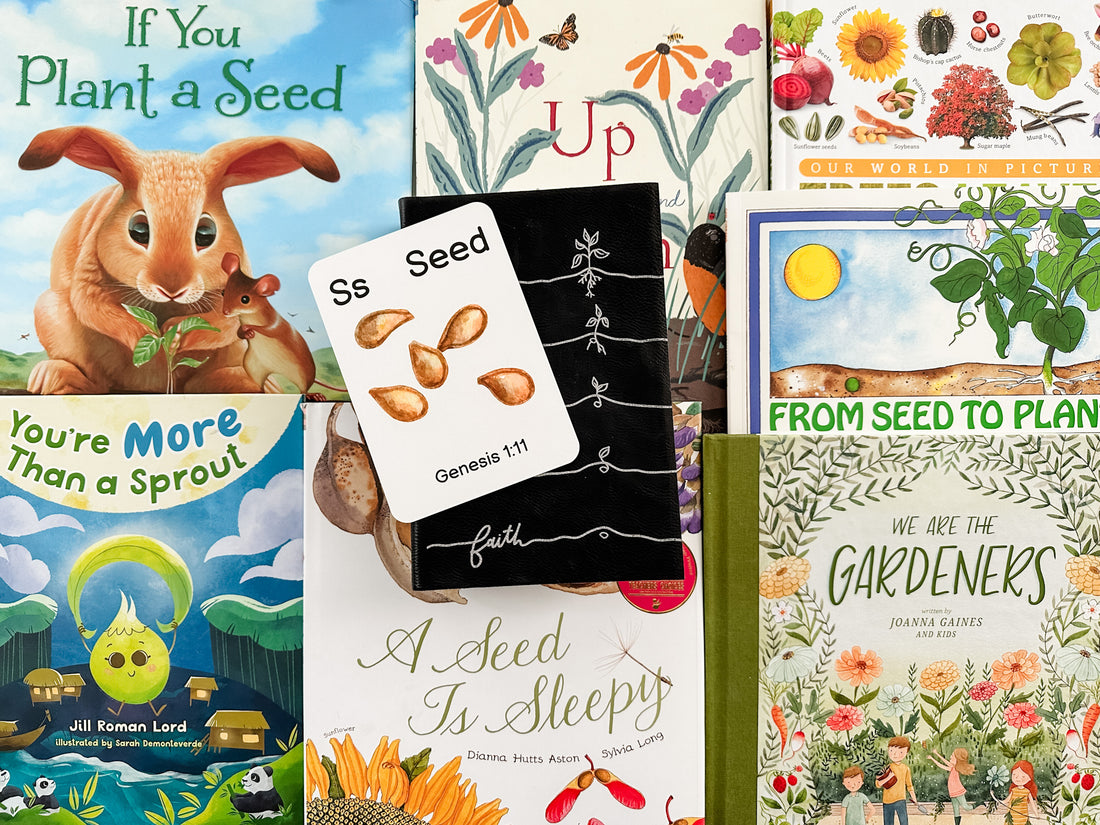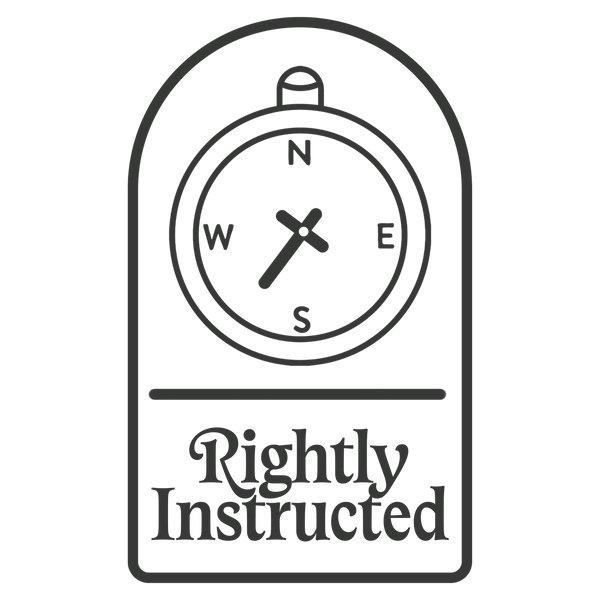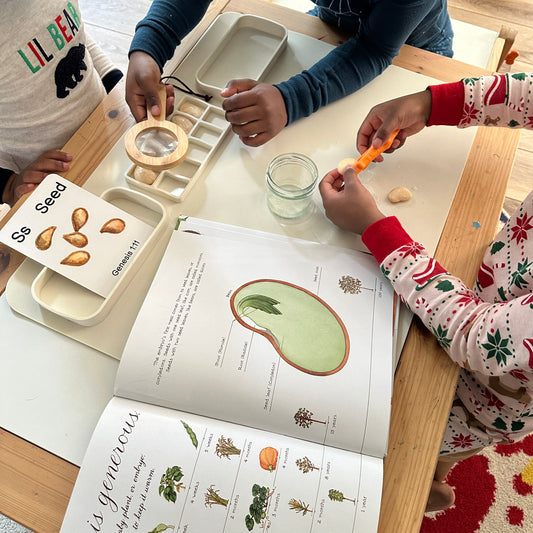
How to Turn Sunday's Sermon into A Homeschool Unit Study
Share
Have you ever felt inspired to somehow connect what was preached on Sunday into your weekly homeschool studies but didn't know how? When our son was still a preschooler, I quickly realized he preferred to sit on the front row of the main sanctuary on any given Sunday than go to kids' church. (Cue dramatic meltdown in the hallway upon trying to check him in...) So we let him stay. Then one Sunday afternoon, I got to thinking about how I could both ensure He was understanding what we were learning in church and use it to introduce academic concepts during our learning time at home. What we came up with was a simple way to turn Sunday's sermon into a homeschool unit study for the week ahead... and get it all planned out while the kids napped on Sunday afternoon!
Start with Scripture.
Start by pulling out a key verse from Sunday's message to use as your memory verse for the week. Each morning during devotion time, spend a few minutes reviewing the verse. What worked well for us was starting with me stating the reference, reading the verse through, then letting the kids repeat the reference and learn the verse phrase by phrase (1-3 words at a time, depending on syllables and complexity).
Select a keyword for the week.
Next, select a keyword directly from the memory verse that represents the focus of the verse and the sermon. Define the word for them, and if you like, teach them how to say the word in another language you speak or are studying. (This is totally optional, but our kids really enjoyed learning words in both Spanish and French, since we have family members and friends that speak those languages.)
Choose a letter to focus on.
Usually this is just the first letter of the word of the week. Review the letter name and sound (as heard in the keyword and verse). Listen for that letter sound when reading aloud, and try to spot the letter on labels, signs, wherever words are written. Sometimes we'd play I-spy style games to find the letter in books, around the house, or while we'e out and about. Using play dough or loose parts to build the letter shape is a fun way to help little hands get ready for writing.
Plan the worship set.
Scroll through your music library to find worship songs that match the message theme or use the keyword for the week. These are the songs we play in the background during activities, in the car, or as "Mommy's choice" during worship time. I get the last song pick, so it transitions us nicely into our structured learning time.
Connect the sermon to their life.
Use your church notes for this! Highlight some key points and connect them to stories or examples in your real life. Connect the dots between real life experiences and the verse to help your little one see how Scripture applies to their daily lives. In our home, this part usually happens on the fly, since I always start by asking the kids what they remember from the message. I expound on their summaries by bringing in our memory verse and word of the week, trying to make it as concise and interactive as possible. This is a great opportunity to get out in the world and see things in real life. Yay for field trips! I'll wrap up with one key takeaway from our discussion that we can focus on for the week, which normally is one of the next things:
Highlight attributes or actions.
Be sure to ask these two questions: "What's one thing we learned about God, or about ourselves, from this week's message?" "Is there something we can focus on doing, or doing differently, based on what we learned?" When prepping for this part, jot down your own answers to guide the kids if needed (though their answers are usually pretty insightful!) Noticing these attributes and actions can lead to dynamic conversations about how God fits into our everyday lives, and how we can remain mindful of Him outside of church.
Make it a true, academic unit study with books. Lots of books!
If you're a bookworm like me, this is the most fun part of the planning process! There are so many incredible picture books out there that are as beautiful as they are informative. Living books are our preference; they present concepts using rich language in a more narrative form (rather than the matter-of-fact writing style of traditional textbooks). If you can, include an illustrated reference book on the subject for the kids to flip through at their leisure. You'll be surprised how inviting these are, and how they spark a child's curiosity and desire to engage with a subject even outside of structured learning time.
Look for books that connect the topic with multiple academic subjects, including math, social studies, science and music or art if possible. You can spread these out over the week, diving into one topic each day.
My book hunt starts with scouring the shelves of our home library to see what we already have on the topic. If I want to supplement with additional titles, my next stop is the Read-Aloud Revival book lists. These are beautifully curated lists that provide a vetted selection of titles to consider for our unit study. From there, I'll type the book title + "read aloud" into YouTube and preview the book that way. If I like it and our local library has it, I'll request a hold online or just head over and grab what I need.
In a single afternoon, you can turn a Sunday sermon into a week-long homeschool unit study for your family. Of course, the beauty of unit studies is that they can grow to include all of your interests on the topic. Spend as much or as little time as you like exploring various aspects of the subject from scientific, historical or other academic perspectives. The best part is, you've done it with an anchor to the Word of God!
Get it done for you!
We used this same process to develop Creation Exploration: A to Z, our homeschool science and nature unit study series for Kindergarten and 1st grade. In this program you'll find a guided unit study for each letter of the alphabet (plus alternate vowel sounds). Each unit begins with a True North devotion that orients your learning towards Christ, and then introduces the science focus along with academic connections to literacy, math, social studies, health and wellness and STEM and Christ-like character training. Multi-sensory activity prompts bring the concepts to life along with curated worship playlists for each theme, accessible via Apple Music and Spotify.
TL;DR
How to turn Sunday's Sermon into a Homeschool Unit Study
- Choose a Scripture from the message that conveys the main idea.
- Select a keyword out of the Bible verse that captures the theme.
- Literacy connection: Hone in on the first letter of the keyword. Focus on recognizing the letter, learning its sound (as heard in the keyword) and building its shape with play dough or by aligning loose parts.
- Make a themed worship playlist of songs that connect to the topic.
- Connect the sermon to their life by recalling experiences or everyday moments that relate to the theme. [Insert field trip!]
- Highlight attributes or actions that this topic can help us see in God and take ourselves.
- Bring on the books! Choose beautifully illustrated books that present the topics using rich, engaging language. Approach the topic from multiple academic perspectives. Math picture books, science texts and biographies about people who have worked in the subject area are great places to start.
- Get it done for you! Check out Creation Exploration: A to Z, our collection of science and nature studies for Kindergarten and 1st grade.
This is just one way to turn a Sunday sermon into a homeschool unit study to help keep Christ as the source and center of your learning. As you listen to your children, what stands out to them from their church experience, the questions they have and the stories they want to read over and over again, you'll get a feel for how best to plan studies and activities that will resonate.
Happy learning!



